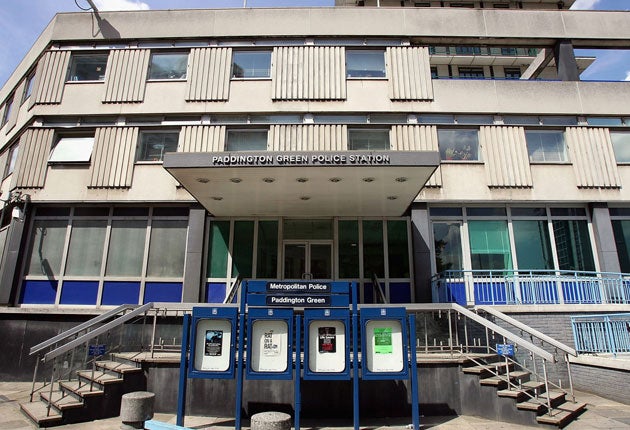£490,000 to make Paddington Green habitable
Terror suspects held in cells will be able to watch films and listen to music

Your support helps us to tell the story
From reproductive rights to climate change to Big Tech, The Independent is on the ground when the story is developing. Whether it's investigating the financials of Elon Musk's pro-Trump PAC or producing our latest documentary, 'The A Word', which shines a light on the American women fighting for reproductive rights, we know how important it is to parse out the facts from the messaging.
At such a critical moment in US history, we need reporters on the ground. Your donation allows us to keep sending journalists to speak to both sides of the story.
The Independent is trusted by Americans across the entire political spectrum. And unlike many other quality news outlets, we choose not to lock Americans out of our reporting and analysis with paywalls. We believe quality journalism should be available to everyone, paid for by those who can afford it.
Your support makes all the difference.For more than 40 years it has revelled in its reputation as Britain's most unwelcoming police station. Deep below Paddington Green's ugly 1960s facade its bomb-proof cells have provided an unpleasant home to some very unpleasant people.
The occupants of the 12ft by 12ft cells have included numerous members of the IRA, the failed 21/7 London bombers and many other al-Qa'ida suspects.
They and their lawyers have all complained about the Spartan facilities. The 16 cells have no windows; just a bed and a toilet. In winter, they're too cold and in summer too hot. Their white tiles were even rumoured to be symmetrical to prevent suspects from focusing on an image to block out interrogation.
But all that is about to change. Following recommendations from Lord Carlile, the official reviewer of the Government's terrorism laws, the cells are about to "re-open" after being refurbished at a cost of £490,000.
They will now include an "audio and visual system" where prisoners will be able to watch films and listen to music. They will also have their own desks with writing material provided. Yet the decision to afford terror suspects this type of treatment has not gone down well with some counter-terror officers.
One told The Independent: "If you beat up your wife or have a fight down the pub you will be slung in a cramped cell with nothing more than a toilet and a mattress. But if you are a terrorist intent on blowing things up then you get a luxurious cell with a telly and a CD player. It doesn't seem right."
The decision to upgrade Paddington Green's facilities was taken after legislation was passed allowing the police to hold terror suspects for almost a month in the cells. Lord Carlile's human rights committee said the cells were not fit to house suspects for any longer than 14 days. The refurbishment began in January this year and will be complete on 29 May.
A spokeswoman for the Metropolitan Police said: "The Metropolitan Police undertook a review of facilities for detainees who can be held for extended periods of time. This was in light of recommendations for improvements following an independent review of the facilities by organisations including the Independent Police Complaints Commission and the European Committee for the Prevention of Torture and Inhumane or Degrading Treatment.
"As a result of this the custody facilities have been refurbished taking into account the fact that certain individuals can be held for 14 days under the Terrorism Act, if the police wish, or 28 days if a senior judge approves."
The police now provide a range of films and music, and the suspected terrorists can choose when to watch and listen to them. However, they cannot, the police stress, access outside channels. "So they won't be able to watch the news or EastEnders or anything like that," the spokeswoman added.
Asked for the reason for such comforts being introduced, she said: "The suggestion was that it is inhumane to keep people locked up for that length of time without stimulation."
Terrorist prisoners, since the rise of global Islamist jihadism, have also been treated differently to mainstream suspects in other ways. Because officers are looking to capture residue from explosives, they must be careful to ensure that the suspects do not come into contact with anything that they could later claim contaminated them. So the insides of the cells are coated in brown paper ahead of the suspect's arrival.
Suspects are transported in low-mileage hire cars which are covered in brown paper and thoroughly cleaned. Terror suspects are immediately dressed in white forensic suits, to negate the possibility of the clothes underneath becoming cross-contaminated.
Join our commenting forum
Join thought-provoking conversations, follow other Independent readers and see their replies
Comments